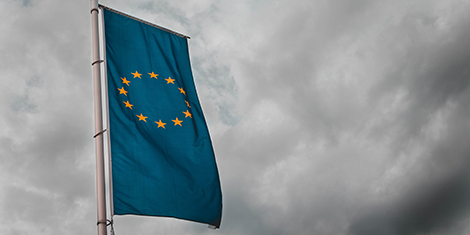By Zaki Laïdi
 For the first time since 1957, Europe finds itself in a situation where three major powers—the United States, China and Russia—have an interest in weakening it. They may squeeze the European Union in very different ways, but they share an essential hostility to its governance model.
For the first time since 1957, Europe finds itself in a situation where three major powers—the United States, China and Russia—have an interest in weakening it. They may squeeze the European Union in very different ways, but they share an essential hostility to its governance model.
The European model, after all, is based on the principle of shared sovereignty among states in crucial areas such as market standards and trade. That liberal idea is antithetical to the American, Chinese and Russian view of sovereignty, which places the prerogative of states above global rules and norms of behaviour. Shared sovereignty is possible only among liberal states; unalloyed sovereignty is the preserve of populists and authoritarians.
But today’s anti-EU hostility also owes something to Europe’s undeniable economic weight in the world. Without the EU, the US under President Donald Trump would likely have succeeded already in forcing Germany and France to surrender to its trade demands. Had it been on its own, France wouldn’t have been able to reject bilateral negotiations with the US over agricultural issues. The EU, as a ‘common front’, works as a power multiplier for its constituent parts in all areas in which sovereignty is shared.
China’s view of Europe is not so different from Trump’s. While the Chinese have taken advantage of the European single market by acquiring footholds in key EU countries, the last thing they want is for Europeans to share sovereignty in controlling foreign investment, such as through the new screening mechanism launched last April. China has been cultivating financial dependencies in the Balkans, knowing full well that if these countries become EU members, they will be subject to stronger transparency requirements.
Beijing would much prefer the model underpinning the Belt and Road Initiative, its massive effort to build trade and transport infrastructure linking China with Africa and Europe. How China and participating countries finance BRI projects is notoriously opaque. In fact, more than half of all Chinese loans to developing countries are not even listed publicly.
Russia, too, resents European unity. Although some EU member states oppose continued sanctions against Russia, all have respected them. Still, Europe is hardly a monolithic bloc when it comes to Russia. Despite Europe’s energy-independence objectives, Germany is cooperating with Russia in building the Nord Stream 2 gas pipeline. For a while, Germany also stood in the way of a firmer EU policy vis-à-vis China, owing to the German auto industry’s reliance on the Chinese market. But Germany’s position has changed since 2017, and its leaders are finally taking stock of the risks posed by Chinese takeovers in sensitive industrial sectors.
The frequent claim that Europe is incapable of playing a global role is thus simply incorrect. Compared with a more isolated developed country like Japan, Europe is quite strong indeed. While Japan has been at the mercy of US tariffs on imported steel, the EU has retaliated in kind. And while Japan has had little choice but to accept a bilateral trade deal with the US (‘in principle’), Europe has stonewalled the Trump administration’s attempts to overhaul the US–EU trade arrangement.
To be sure, the EU is still a long way from achieving strategic and economic autonomy. But that doesn’t mean it’s incapable of doing so. Europe has many assets with which to defend multilateralism and international norms. Given its creativity and massive market, it could play a critical role in setting the standards for digitalisation and artificial intelligence—both of which are at the heart of today’s global economic battle. Lest one forget, it was Europe that took the first step in regulating the platform economy, through the General Data Protection Regulation, which has already set a new world standard.
But Europe still needs to develop its monetary, industrial and military capacity. The EU must expand the international role of the euro so that it can serve as a safe asset and a standard currency for cross-border trade. Internationalising the euro will require a deep capital market, comparable to that of the US, and there’s already a consensus among eurozone member states in favor of heading in that direction.
Establishing the euro as a safe asset—that is, making a Eurobond equivalent to a US Treasury bill—is more controversial. Germany is staunchly opposed to any proposal that implies risk-sharing across the eurozone. But if foreign investors are not confident that the European Central Bank will defend the value of the euro in any eurozone country, they will never see the single currency as a rival to the dollar.
On the second point, Europe needs to create its own industrial ‘champions’. That will require deepening the internal market, which remains far too fragmented with respect to services. It also may call for a reconsideration of EU competition rules. Following EU antitrust authorities’ decision to block a number of large mergers last year—not least that between Alstom and Siemens—there’s a growing debate within Europe about how competition policies can be improved.
Finally, Europe desperately needs to build up its military capacity, to lend credibility to its exercise of commercial and soft power. For example, a new European protection force deployed in the Strait of Hormuz would signal to both the US and Iran that Europe can defend its own interests without having to take sides against its allies. The capacity to project power is a fundamental source of global clout.
Europe does not need a ‘grand strategy’, which is a pompous term that fails to account for local and global constraints. Rather, it needs the determination and political will to develop new commercial, diplomatic and military strategic assets. In a world of sabre-rattling and muscle-flexing, effective modesty is preferable to vacuous ambition.
No comments:
Post a Comment